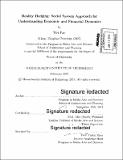| dc.contributor.advisor | Alex (Sandy) Pentland. | en_US |
| dc.contributor.author | Pan, Wei, Ph. D. Massachusetts Institute of Technology | en_US |
| dc.contributor.other | Massachusetts Institute of Technology. Department of Architecture. Program in Media Arts and Sciences. | en_US |
| dc.date.accessioned | 2015-07-31T19:09:35Z | |
| dc.date.available | 2015-07-31T19:09:35Z | |
| dc.date.copyright | 2015 | en_US |
| dc.date.issued | 2015 | en_US |
| dc.identifier.uri | http://hdl.handle.net/1721.1/97971 | |
| dc.description | Thesis: Ph. D., Massachusetts Institute of Technology, School of Architecture and Planning, Program in Media Arts and Sciences, 2015. | en_US |
| dc.description | Cataloged from PDF version of thesis. | en_US |
| dc.description | Includes bibliographical references (pages 101-112). | en_US |
| dc.description.abstract | This dissertation's main contribution is a new methodology, Reality Hedging, which is to use big-data driven approaches and tools from Computational Social Science for understanding, monitoring and designing economic and financial systems. The center idea in this approach is to treat economic and financial systems as systems of connected people. We are entering a new age where many aspects of our lives are digitized thanks to social media and smart phones. As we see many areas of research topics using these datasets to establish new behavioral and social theories about our society (e.g.: Reality Mining, Social Network Analysis, etc), it is natural to ask if and how we can use these advancements to build better economic and financial structures and institutions especially after the past financial crisis. After all, all economic systems are systems of people, rather than systems of atoms which always follow the same physics principles and mechanism. I collected and analyzed some large economic and financial social systems from individual levels to city levels. Many connections between financial dynamics with social dynamics were examined. I also focus on results and findings that can be used to build resilient and productive economic systems, and can be used to hedge out risks resulting from the social connectivity. In this thesis, I will discuss my research efforts in collecting valuable large-scale behavior data using smart phones. I will show that such datasets are helpful in inferring individual financial status. I will expand individual observations to new models for understanding the innovation economics in cities. I will continue to elaborate the idea of idea flow in behavior changes by focusing on the study of an online trading platform which allows traders to discuss and share trades with each other. | en_US |
| dc.description.statementofresponsibility | by Wei Pan. | en_US |
| dc.format.extent | 112 pages | en_US |
| dc.language.iso | eng | en_US |
| dc.publisher | Massachusetts Institute of Technology | en_US |
| dc.rights | M.I.T. theses are protected by copyright. They may be viewed from this source for any purpose, but reproduction or distribution in any format is prohibited without written permission. See provided URL for inquiries about permission. | en_US |
| dc.rights.uri | http://dspace.mit.edu/handle/1721.1/7582 | en_US |
| dc.subject | Architecture. Program in Media Arts and Sciences. | en_US |
| dc.title | Reality hedging : social system approach for understanding economic and financial dynamics | en_US |
| dc.title.alternative | Social system approach for understanding economic and financial dynamics | en_US |
| dc.type | Thesis | en_US |
| dc.description.degree | Ph. D. | en_US |
| dc.contributor.department | Program in Media Arts and Sciences (Massachusetts Institute of Technology) | |
| dc.identifier.oclc | 913963198 | en_US |
